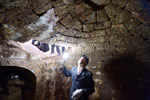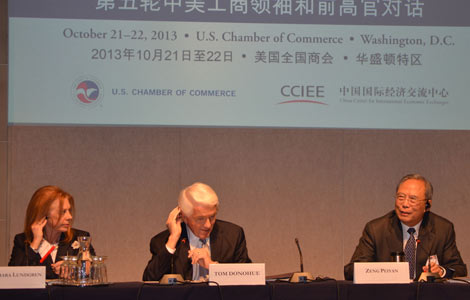Banned Chinese researchers get clarification letter from NASA conference
Updated: 2013-10-20 03:37
(Xinhua)
|
||||||||
WASHINGTON - Chinese researches who are banned from attending a NASA conference on exoplanet research have received a letter of clarification from the committee organizing the event informing them of a revised decision.
"A few weeks ago, you received an email ... noting that we were unable to accommodate your request to attend the Second Kepler Science Conference at the NASA Ames Research Center," according to a copy of the letter obtained by Xinhua on Saturday from one of the banned researchers, who refused to be named.
"We have since been able to clarify the intent of the referenced legislation and are pleased to inform you that this decision has been reversed and your paperwork is being reviewed for clearance," the letter said.
"We hope you will be able to join us and celebrate the science enabled by Kepler," it added.
The ban, based on a controversial law passed in 2011 that prohibits government funds from being used to host Chinese nationals at NASA facilities, sparked a boycott of the meeting from several prominent American scientists, including Professor Debra Fischer of Yale University, and Professor Geoff Marcy of the University of California, Berkeley.
Last week, NASA administrator Charles Bolden blamed "mid-level managers" for the so-called misinterpretation and vowed to reconsider the applications of six Chinese researchers.
In a separate letter the Chinese researchers received, the organizers said with the re-opening of the US federal government and the lifting of furloughs, the conference will go ahead as planned on Nov. 4-8 at NASA Ames Research Center.
"We anticipate that foreign national registrants will be cleared for attendance prior to the conference start," it said. " All foreign national registrants will receive notification as soon as clearance has been granted."
Gregory Kulacki, a senior analyst with the US-based Union of Concerned Scientists' Global Security Program, believed that recent problems arising from the ban should be served as a wake-up call for "a few individuals within the United States Congress, in particular Congressman Frank Wolf," who crafted the law.
Kulacki said the language of the law is "so broad, and the legal and financial penalties associated with potential violations so threatening, that even US organizations not directly administered by NASA are afraid to reach out to colleagues in China."
 Apple unveils new Macs, iPad ahead of holidays
Apple unveils new Macs, iPad ahead of holidays
 Smart cities to aid urbanization
Smart cities to aid urbanization
 In control & breaking the mold
In control & breaking the mold
 Higher retirement age may help solve pension problem
Higher retirement age may help solve pension problem
 Northeast remains shrouded in smog for third straight day
Northeast remains shrouded in smog for third straight day
 Beijing Opera troupe perform in Brazil
Beijing Opera troupe perform in Brazil
 Nature's masterpieces
Nature's masterpieces
 Riot police off to Libya peacekeeping mission
Riot police off to Libya peacekeeping mission
Most Viewed
Editor's Picks

|

|

|

|

|

|
Today's Top News
NASA: Chinese scientists are now welcome
Yingli uses US baseball stars in campaign
Top officials promote new relations
China's US Treasury holdings hit six-month low
Graduate looks at kung fu-hip hop connection
Apple unveils new Macs, iPad
San Francisco train service restarts after strike
China, Russia reach big oil deal
US Weekly

|

|





